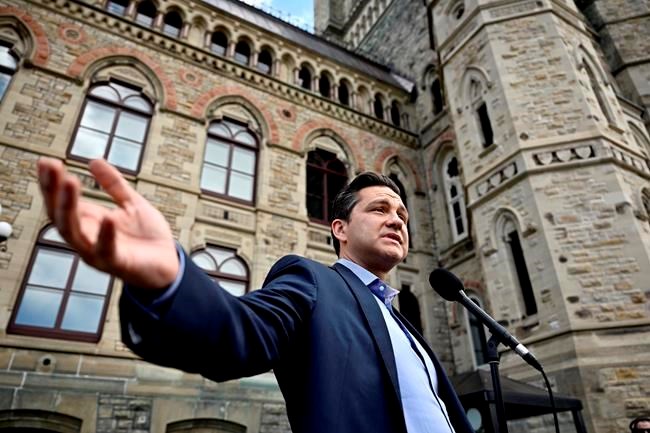OTTAWA — Canada's immigration system is broken, Conservative Leader Pierre Poilievre charged Tuesday, as he sidestepped questions about whether he would change current targets.
Appearing before reporters on Parliament Hill, Poilievre criticized Prime Minister Justin Trudeau's recent comments on housing and pledged to speed up entry for immigrants skilled in the building trades.
The federal government has set a target of welcoming 500,000 immigrants per year by 2025, although some worry about the pressure that could add to the country's housing crisis, driven by what experts agree is a supply shortage.
Ottawa has defended its ambitious target as necessary given the labour shortage and thousands of job vacancies that employers continue to experience since the COVID-19 pandemic, which triggered widespread lockdowns.
Poilievre slammed the Liberal target as driven by Trudeau's "ideology," but he did not answer repeated questions about whether he would consider reducing the number.
He said a Conservative government would base its immigration policy on the needs of private-sector employers, the degree to which charities plan to support refugees and the desire for family reunification.
"I'll make sure we have housing and health care so that when people come here they have a roof overhead and care when they need it," he said Tuesday.
"I'll make sure that it's easier for employers to fill genuine job vacancies they cannot fill."
Statistics Canada reported last month the country is facing a little more than 781,000 job vacancies.
Poilievre's comments come as the Conservatives try to increase their support in newcomer communities in some of the country's largest cities and suburbs, selling the party as pro-immigration.
The Tories have struggled to rebuild such support since losing government in 2015, when they campaigned on a pledge to set up a tip line for so-called "barbaric cultural practices."
A review of the party's 2021 election loss called for recruitment of more diverse candidates and better outreach to cultural communities.
Besides appearing at numerous ethnic media roundtables, attending different cultural events and meeting with various business groups, Poilievre has championed cost-of-living issues in his outreach, from a lack of affordable housing to high food prices.
Rather than discussing immigration targets, the Conservative leader has focused on the system's shortcomings.
His opponents, however, have been carefully watching his position. The federal NDP attacked Poilievre back in May for supporting a Bloc Québécois motion that condemned the government's immigration goals for not properly considering their impact on the French language in Quebec, as well as housing, schools and health-care.
In his outreach, Poilievre has also honed in on concerns about the number of international students to die by suicide since the pandemic, with more relying on food banks.
He has promised to speed up licensing processes for doctors and nurses who come to Canada, saying Tuesday the Conservatives would ensure "that immigrants who come here as professionals get a chance to work in their profession."
He also took aim at new Housing Minister Sean Fraser, who served in the immigration portfolio before the recent cabinet shuffle.
Calling Fraser "the worst immigration minister in Canadian history," Poilievre blamed him and Trudeau for refugee claimants sleeping on Toronto's streets due to a lack of spaces in the city's shelter system.
The federal government recently announced it would give the city almost $100 million to help find housing.
This report by The Canadian Press was first published Aug. 1, 2023.
Stephanie Taylor, The Canadian Press



